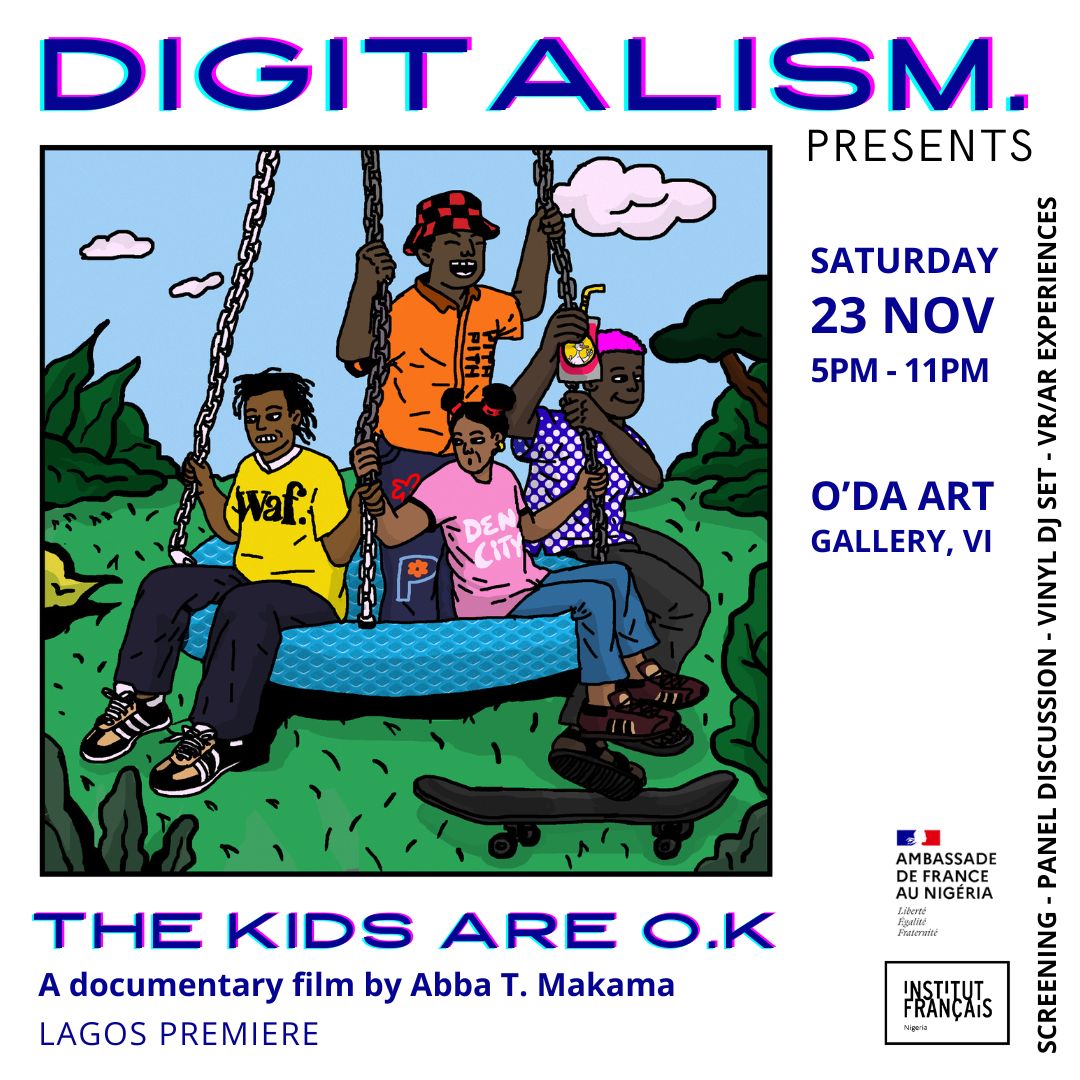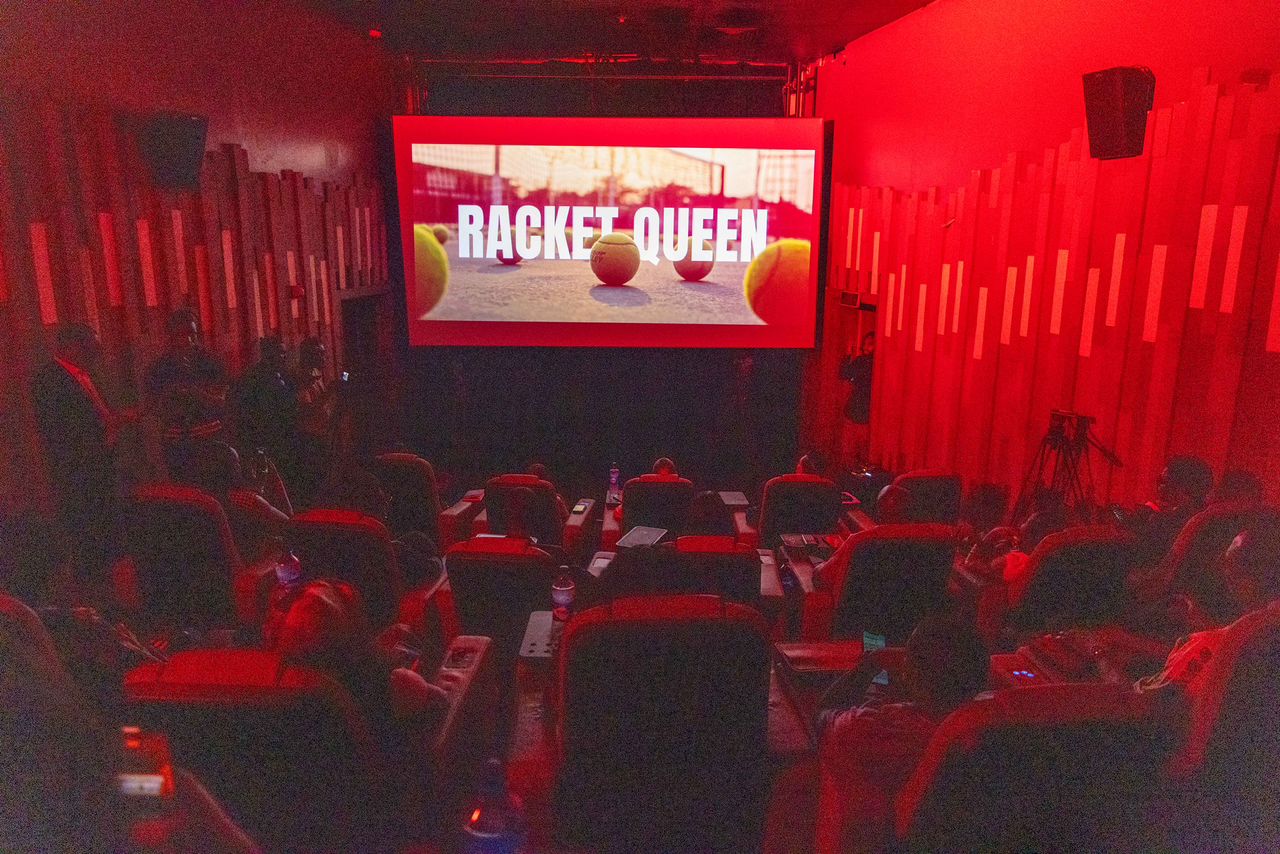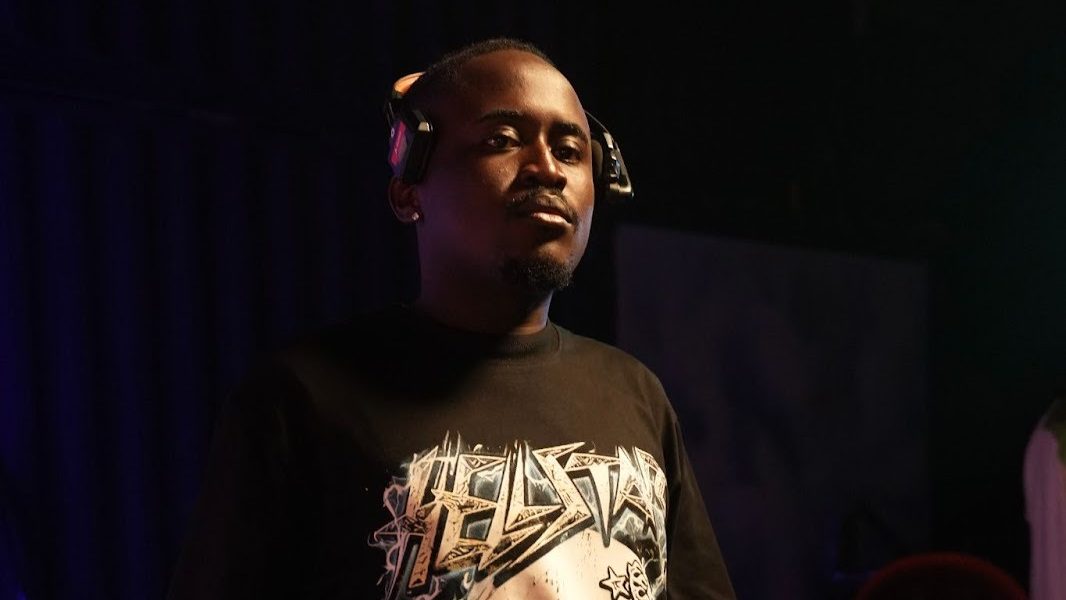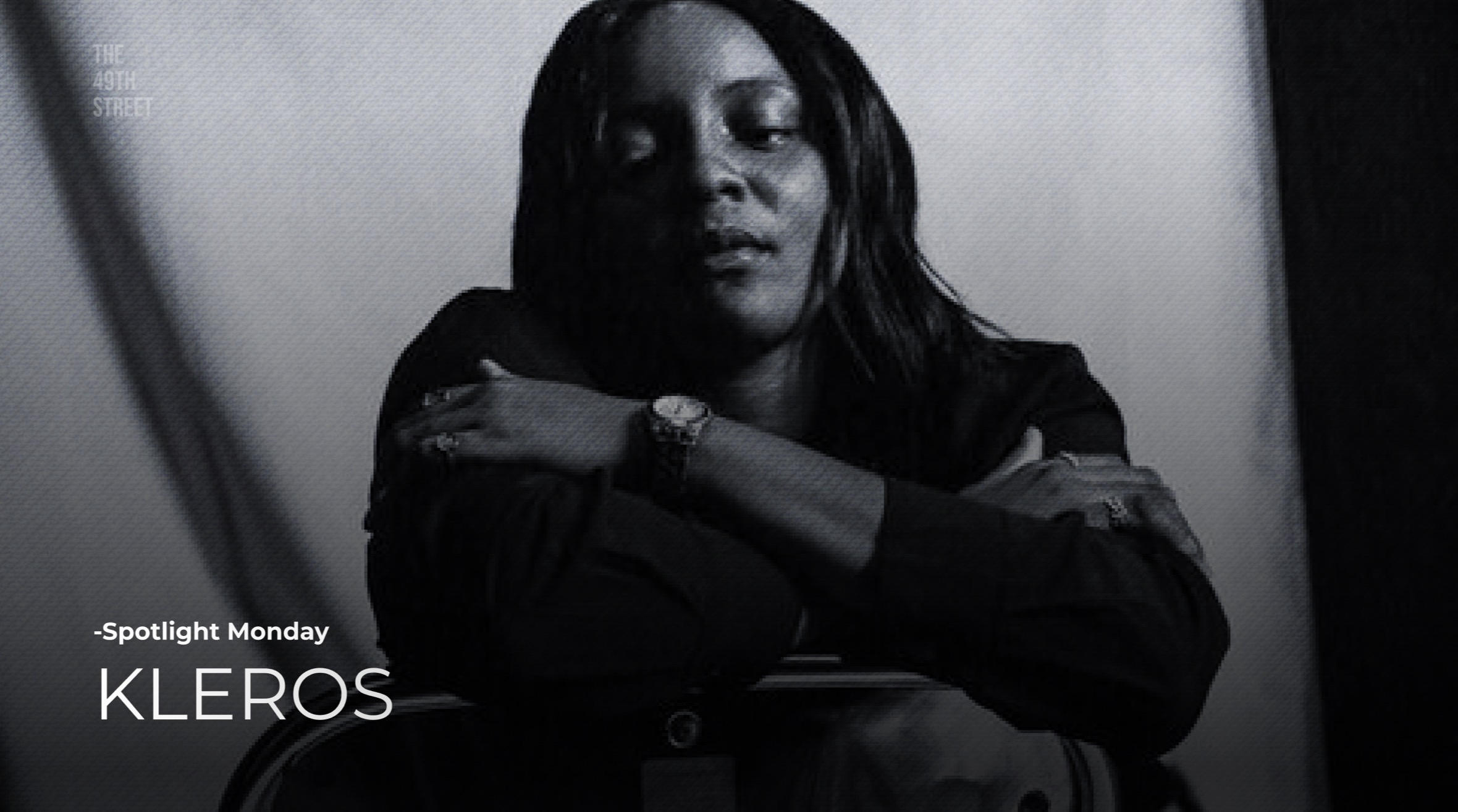by Adedapo Adeniyi
On November 23rd, Nigerian indie filmmaker Abba Makama, one of the founding members of the S16 Collective, hosted Digitalism, a screening event for his new film, The Kids Are O.K. The Kids Are O.K. is a documentary exploring the alternative subculture scene in the city of Lagos, which he dubbed “A Mumu’s guide to alte.”
Digitalism transcended just the screening of the film and became its own peculiar experience with the familiarities of the Lagos alte scene. Before the scheduled time for the start of the film, Jomi Bello – the founder of WAF(WafflesNCream), the city’s primary skateboarding collective slash business slash family, live-mixed his collection of vinyls, spinning records from Sade to Odunsi The Engine to Daft Punk and 50 Cent, making time between the music to engage with anyone in front of the decks about his love for mixing vinyls as an art form, occasionally disappearing into his headphones to induce sonic trances.
Love letters to Alte were spotlighted at the venue, VR experiences that immersed the viewer into the vibrancy of the Group Therapy rave-an EDM-House music haven for queer people, the alternative crowd, and electronic music lovers- as well as alternatively, the fast-paced danger and adrenaline of WAF top skater, Fahd, skating along Lagos streets. A large whiteboard with the question, ‘What Does Alte Mean To You?’ invited screening attendees to pick up markers and draw or write their subjectivity on the counterculture movement.
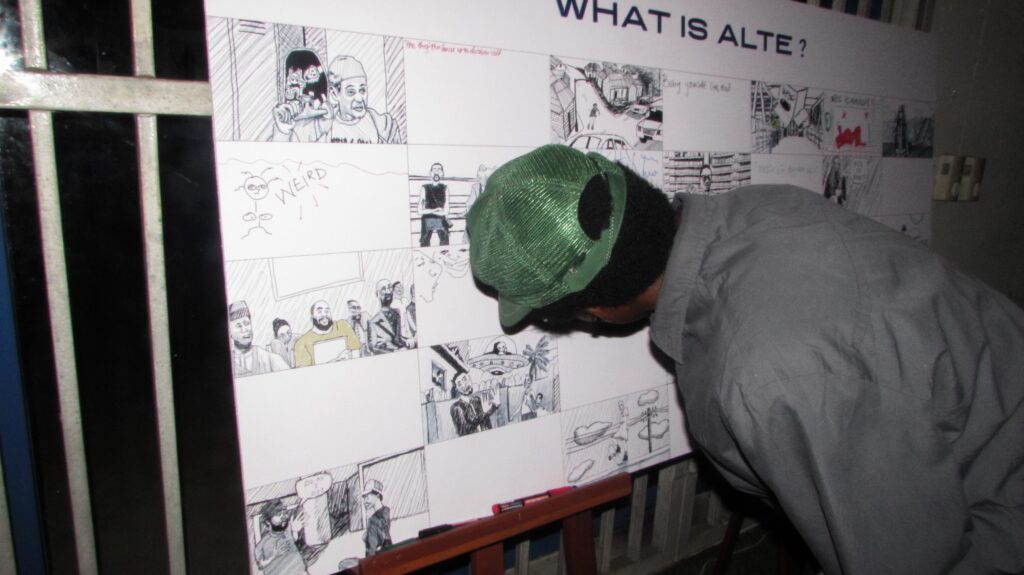
A curated playlist by Abba himself titled ‘ALTE DIGS’ with songs by artists ranging from Indigenous Alte contemporaries, Cruel Santino, Prettyboy D-O, and Falana, to vintage maestros of Nigerian alternative music, William Onyeabor and Sir Victor Uwaifo, to the Western alt, Death Grips, MGMT, JPEGMAFIA and James Blake. A solitary microphone and recorder lay on a table next to the whiteboard for anyone to record their thoughts on Alte as well as what it meant to be alternative in the digital age. These installations acted as a way of inviting the audience to be active participators in the show while strongly pushing the digitalist theme.
The director, Abba Makama, appeared in his signature all-black attire and hovered around like a ghoul at his own event as everyone related warmly in the familiarity of community. Shaking hands, hugging, cameras flashing, all smiles in conversation, and sipping Quacktails cocktail pouches – a staple of the Lagos art event scene, notoriously appearing at raves, exhibitions, film screenings, and everywhere those who do not belong went to belong.
Pregaming faded to a stop, and by 7pm, there were more people than chairs, Abba took to the stage to welcome and thank everyone, he introduced the film and was drowned in applause. Several technical difficulties ensued that were a testament to the gonzo nature of the making of the film and the Nigerian artist’s struggle of trying to be different or make and present art in a country against you.
By the time the film itself started, everyone could tell that it was made with the passion of a person who had spent years around alte people and appreciated them. In the one hour runtime of the documentary, multiple facets of the alternative scene were shown, with different chapters dedicated to skate culture, fashion, queerness, music, rave culture, activism, past, present and future alte.
Appearances varied from multiple eccentrics in the city: alte poster girl and fashion powerhouse Ashley Okoli. Quacktails founder Dare Aderinokun(Bosc) with his signature facial piercings and dyed hair. PITH Africa founders, Cosmas Ojemen, Nez Anazodo and Adedayo Laketu. Cult designer and founder of IAMISIGO, Bubu Ogisi. Co-founder of hFACTOR, Dolapo Osunsina. Jazzhole’s Mr Kunle Tejuoso. DJ and founder of Dencity, an all-female & queer skate collective, Blessing Ewona. ‘Ibadan Hipster’ and podcast host, TMT. WAF founder Jomi Bello alongside many others. These being some of the definitive characters that have seen and been a part of what alte has become today. Experimentalists defying convention.
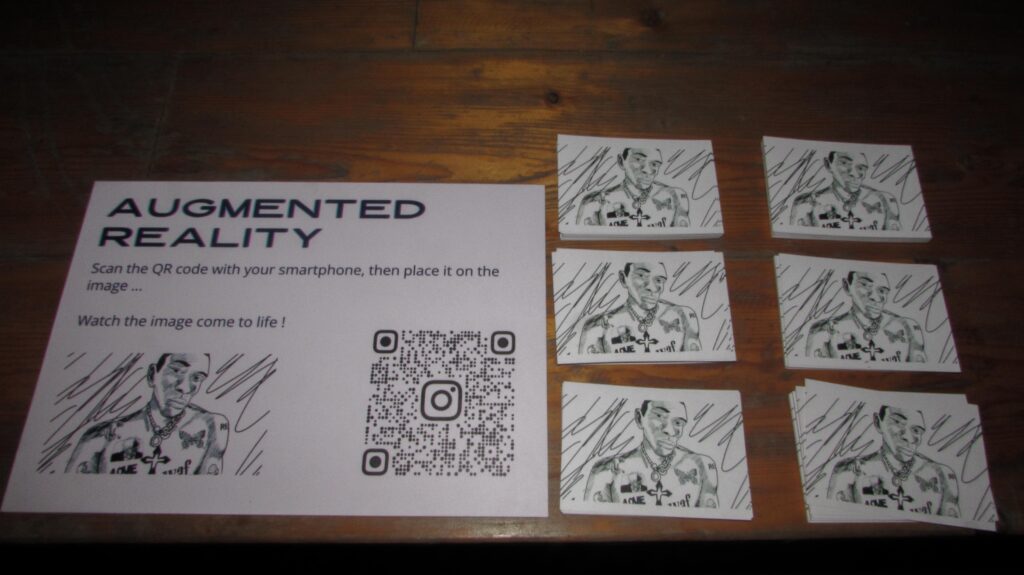
The doc started with the question of defining alte, with everyone having a different answer; it began with an insight into the diversity of the movement, the freedom of it, the expressivity that came with being alternative, that anyone could define themselves out of the system, out of a predetermined structure, out of rules, borderline aesthetically anarchistic. This defiance would become more pronounced in the early 2010s, with musicians like BOJ, Cruel Santino and DRB Lasgidi pioneering the movement and even coining the term ‘alte’ and popularizing it – This is as far as they’re mentioned in the doc as it doesn’t delve into the music of the scene.
The stylistic cinematography shines through as shots contrast between static(during interviews) and more free form to capture the liberated spirit of the characters being shown, we’re taken on an odyssey of the city.
Blessing Ewona highlights the struggles of female and queer skating and the need she felt to establish her own inclusive community; we are taken through a tour of the THISISIUS fashion house, TMT shows us Jazzhole, his favorite record and book store where we meet the store’s owner Mr Tejuoso, a collector/archivist.
PITH founders explain to us the essence of their brand and its peculiarity, Bubu Ogisi shows us clothes made out of tree bark and raffia, a meditative interlude shows Abba exploring his spirituality, Bosco talks transitioning from the world of finance into making cocktails, archival footage shows Wole Soyinka in court being interrogated on his cultism, Dolapo speaks on the growing ballroom scene and the need for a safe queer space and home to belong.
The events of the 2020s ENDSARS protests are brought up, a dark time for the country when the youth came out to protest the unlawful brutality and killings faced at the hands of the police; the people united in the streets to speak out against the censorship of their self-expression. A somber moment in recent times that showed how strong we were together but also exposed the darkness and bleak reality of non-conformity and defiance in modern Nigeria, something the alte scene has become too familiar with, being occasionally accused of cultism, mental illness, drug addiction and sexual deviance, God forbid a person is anything other than a predetermined image of unambiguous morality.
The film ends on an optimistic note, an air of prevalence; Abba’s film champions the movement and believes in it. A movement important to the times has birthed a film important to the movement, even a mumu would’ve come out of the screening sufficiently equipped with knowledge on the counterculture movement, the film preached liberation, expression and fearlessness over all, using the stories of the people shown as an anchor towards a future where we’re unapologetically ourselves.
Of course, not every single facet of the alte community could’ve been fit into the hour-long doc; as mentioned earlier, the most important aspect and one of the earliest which was the music wasn’t sufficiently profounded on, as well as other dominations.
Related: BadOats is Creating New Worlds
One is driven to ask where fashion figures such as Mowalola, Vivendi, Motherlan, and Street Souk founder Ireti Zaccheus are, even if they’re predominantly diaspora-based artists now, or in photography, a medium important to the movement, with people like Chukwuka Nwobi (silent noise), TSE and Stephen Tayo (who had a brief cameo) who have been present in the formative years of the movement, even visual art, with the presence of artists like Chigozie Obi, Ayanfe and Olaolu Slawn, amongst others missing in action. Of course, one must take into consideration the amount of people that were accessible to the director and the grander story he had to tell.
With the Alte movement constantly evolving, one can only imagine that another documentary on the movement is going to be made, either by another director or even a sequel to this one by Abba Makama himself, in years when phrases like alte cinema and alte literature are a thing and many other figures and alternative mediums are highlighted, perhaps we’ll have a manifesto by then, or a headquarters where the song Alte Cruise is recognized as our holy grail, but until then, the credits have rolled on this.
After the film ended, the stage was graced by Wale Lawal, founder of the contemporary socio-cultural magazine The Republic. He was joined by Abba, Ashley, M. Tejuoso and Jomi Bello and a panel ensued. Wale brought up the many ways alternative culture has appeared in Nigerian history over the decades, namedropping revolutionary artists like Amos Tutuola, Twins Seven Seven, Ben Okri, William Onyeabor and even Fela, relating those figures and what they stood for to the present state of the movement.
Ashley engaged on the importance of a safe queer space and why we should be open and accepting to people being and expressing who they want to be. Mr Tejuoso expands on the importance of history and how he’s become increasingly more progressive while also staying true to his artistic sensibilities. Jomi explained his idea of WAF being home to the outlaws and the importance of keeping the kids engaged and interacting with people like them. Abba brought up the importance of the movement in the grander scheme, the future of it in the digital era, with the zenith of the internet and artificial intelligence, and why our stories should be told.
An experience equally fulfilling and enlightening, a diverse crowd of people who came together to find and embrace themselves, reflected in the film and especially at the screening as well, Abba Makama’s Digitalism was a statement and the people listened, may our stories live forever, may our experiences transcend the times, may our personas prevail against adversity. Vive Le Cinema. Vive Le Alte!
The film was dedicated in loving memory to all-round artist and brother Bai Joiner. This article is dedicated to all-round artist and brother Bai Joiner.

